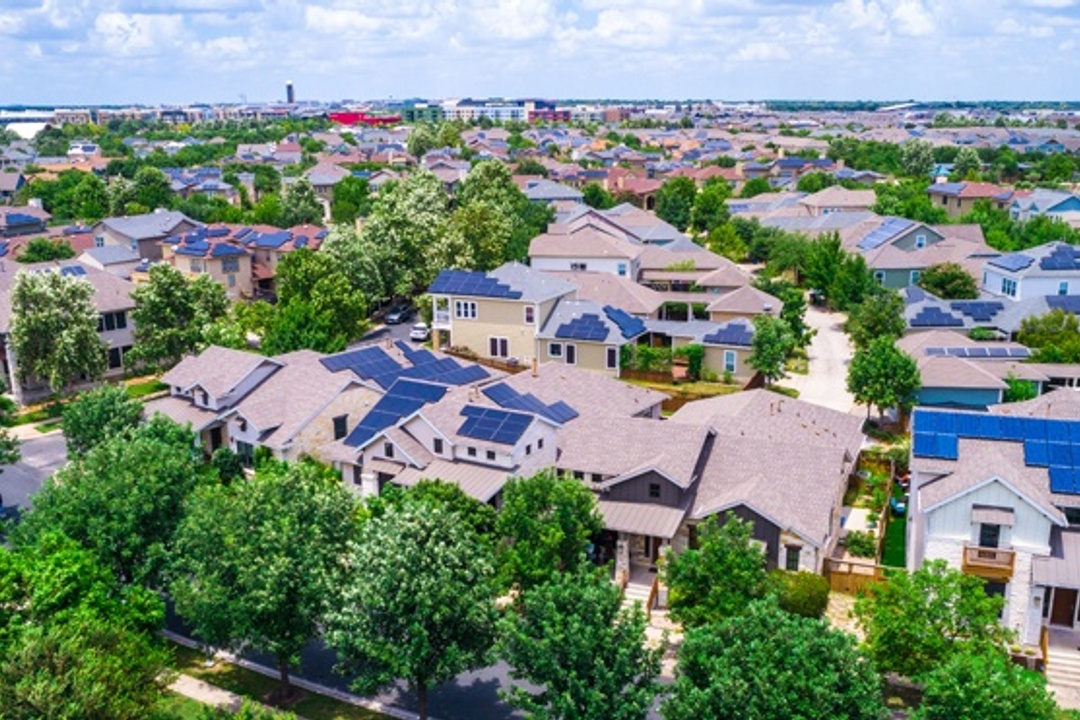
For many people, both young and old, buying real estate feels far away. With increasing housing costs, sky-high student debt, and iffy career prospects, fewer 20-and-30-somethings are choosing to buy a home.
According to data from the 2021 National Association of Realtors (NAR) report, the typical age of all homebuyers has risen to 47 years old, up from 31 years old in 1981. On the other hand, the median age of Texas homebuyers is 47 and the median age of first-time buyers is 32.
Do you want to buy your first house? While statistics on the average age to buy a house are intriguing, comparing yourself to others may not be a good use of your time. Check out the other measurement tools below, in addition to the figures, to discover if you're on track to buy a home.

The Average Age By Year
According to data published by Deutsche Bank, the median age of homebuyers in the United States is now 47. Compare that to the median age of American homebuyers in 1981 which was 31. Notably, during the financial crisis, the median age skyrocketed by eight years as seen in the graph below. A large portion of this increase can be ascribed to the exodus of young, first-time homebuyers from the property market.

Source: Deutsche Bank Research
Home prices have surged in larger U.S. cities that have shown to be more popular with today's young folks. For example in places like Texas, the price of single-family homes has experienced a 122 percent rise since 2000. Inventory is quickly becoming a major issue— baby boomers are increasingly choosing to age in place, and home builders have mostly focused on the upper end of the market since the Great Recession.
Millennials and GenZ are also feeling the effects of school debt. According to a 2017 poll conducted by the National Association of Realtors and the education-financing group American Student Assistance, 83 percent of non-homeowners say student-loan debt has prevented them from buying a home.
This proportion was higher among the older generation of millennials born between 1980 and 1989. According to the same survey, millennials are delaying homeownership by a median of seven years due to college debt.
The demographics of homebuyers in terms of age have continued to shift over the previous years, owing to both stricter lending conditions and a scarcity of inventory on the market, which is driving up home sales prices.

Generational Homeownership Rates
According to U.S. Census Bureau predictions, the millennial generation will have surpassed the Baby Boomers as the most numerous generation by 2019. They represented a larger cohort than Generation X, which numbered approximately 65 million individuals, and had just crept by Baby Boomers, who numbered slightly more than 71 million people.
As such, they constitute a highly enticing population for real estate marketers to target and a generation that should not be disregarded, even though they are perceived to be less prosperous than their predecessors.
According to a recent study, the most populous generation is also the one that lags behind prior generations in terms of property ownership, with 47.9 percent owning homes in 2020, compared to 69 percent for gen-X, 77.8 percent for baby boomers, and 77.8 percent for the silent generation. In fact, property ownership has been declining with each succeeding generation.

Source: ApartmentList.com
However, over the last half-decade, the millennial homeownership rate has climbed faster than that of previous generations. This is mostly symptomatic of the stage of life that millennials are currently in; there are just more new first-time homeowners in their 30s than in their 60s.
Comparing age allows for a more apples-to-apples comparison across generations, and the chart below indicates that, despite recent advances, millennial homeownership continues to lag behind both Generation X and Baby Boomers. At the age of 30, 42 percent of millennials own a home. In comparison, when they were the same age, 48 percent of gen Xers and 51 percent of boomers owned a home.

Source: ApartmentList.com
Why The Median Age Is Getting Older
Faced with rising home prices and mountains of student debt, Americans are waiting longer and longer before purchasing a home. According to a National Association of Realtors survey, the typical age of first-time home purchasers has risen to 33, the oldest in data dating back to 1981. The median age of all buyers also reached a new high of 47, up for the third year in a row – and significantly above the typical age of 31 in 1981.

Source: NAR
While the median age of first-time home purchasers increased by one year, the increase reflects a number of difficulties that Americans face when looking for a home.
A nationwide scarcity of affordable housing, along with decreasing mortgage rates, has driven up prices in cities from the beaches to the interior of the country. At the same time, student loans and other debts make it more difficult for Americans to save tens of thousands of dollars for a down payment, and tight lending rules can make obtaining a bank loan difficult for applicants with less-than-perfect credit.
The rise in the age of repeat buyers is the figure that has changed substantially since 1981. In 1981, the typical age of repeat home buyers was 36, and it is currently 55. This gradual rise can be ascribed to a variety of variables.
Many people are staying in their homes for longer lengths of time, either because they choose to or because their home was worth less than their mortgage following the Great Recession. Tenure in a residence has increased from six to seven years and is now at ten years.

What Age Should You Buy a House?
There is no single answer to this question that will be appropriate for everyone. In general, people should pay less attention to the average age to purchase a home and instead focus on feeling financially and emotionally prepared. Because people come from a wide range of financial backgrounds, the "appropriate" age will be different for everyone.
Instead, consider the following home-buying readiness questions:
Do I think I'm ready to settle down?
Most home buyers will want to stay in one house for a while to offset the one-time, up-front fees that come with owning a home. This may not appeal to someone who prefers more freedom of movement.
Do you feel at ease with the concept of settling down in one place? Is it possible that you or your spouse will be transferred or seek jobs in other locations?
Have I established my financial objectives?
Before purchasing a property, you should consider your financial goals and how owning a home fits within that framework. Do you want to acquire a home before you retire, for example, so you don't have to make mortgage payments in your golden years? What would it take for that to happen?
Am I satisfied with your financial situation?
Making monthly mortgage payments and being your own landlord are significant duties. To truly appreciate living in your house, you may want to ensure that you are financially secure.
Do you feel secure in your current position? Could you afford to pay your mortgage for a few months if you lost your job? Are you prepared in the case of a financial downturn?
Putting off purchasing a house can be beneficial in some cases. You may give yourself more time to create good credit, which may qualify you for the best mortgage rates and conditions available. Furthermore, saving for a significant down payment over time improves the loan-to-value ratio, making it simpler to acquire cheap financing.

Signs You Are Ready to Buy a House
What age you can legally buy a property is essentially less important than the other signals you're ready to buy. Here are a few things you should have to demonstrate that you're ready to buy a home:
You Have A Good Credit Score
A strong credit score is required to purchase your first home. A FICO score is the best type of credit check because it considers more data points when calculating your risk of borrowing money.
FICO ratings are used by all lenders to determine how much you will be charged or whether you will be offered loan insurance. To be deemed "good," your credit score should be 730 or higher. A high credit score will make it easier to obtain a loan and qualify for a lower interest rate.
* You Owe Little Or No Debt: Before purchasing a home, you should be debt-free for at least a year. Although there are several exceptions to this rule, you should still aim to pay off your obligations before purchasing a home.
This is due to the fact that the mortgage will be on your credit report for up to ten years, therefore it is in your best interest to resolve any unfavorable notes on your credit report as soon as possible. If your debt-to-income ratio is greater than 35 percent, you should not purchase a home.
* You Have a Good Job: You must have steady work in order to buy a house. A steady job is any full-time work that you've had for at least two years. The longer you've been at your employment, the more stable it will appear to lenders. Before granting any mortgage loans, they check your employment history to guarantee you can make the payments.
* You Established An Emergency Fund For Yourself: When purchasing your first home, you should have at least three months of living expenses saved. This ensures that you can pay your rent or mortgage if you lose your job or experience an unforeseen expense.

The Advantages of Buying a House Young
Millennials are the largest group of first-time homeowners in America, and many people in their 30s and even their 20s are beginning to see the benefits of purchasing their first house. Unfortunately, numerous factors—student debt, and an unpredictable job market—are preventing Millennials from becoming homeowners, but the figures are rising.
According to a recent Urban Institute study, today's senior folks became homeowners at a younger age than today's young adults. Half of the older adults in the study bought their first home between the ages of 25 and 34, and 27% bought their first home before the age of 25.
Below are some of the impacts of purchasing a home as a young individual:

Source: The Urban Institute
Increased Equity
It's almost a given that most properties in the United States not only hold their value but actually appreciate gradually over time. One advantage of buying young is that you may lock in the current value of your house early and then watch it appreciate over time.
Home values in the United States have risen by 10% in the last year alone, and this trend is expected to continue. Sure, there may be some ups and downs throughout the years, but by the time you're ready to sell or retire, your home may be worth much more than you paid for it if you bought it when you were young.
According to the Urban Institute research, individuals who bought their first home between the ages of 25 and 34 had the most housing wealth by the time they reach their sixties. At the age of 60 or 61, their median home equity (in 2015 inflation-adjusted dollars) is close to $150,000.

Source: The Urban Institute
Those who acquired their homes later had much less housing wealth. There is a $72,000 gap in median housing wealth between those who bought their first home between the ages of 25 and 34 and those who waited until they were 35 to 44.
Freedom to Transform Your Space
When you own at a young age, you have more freedom to design your space and actually settle in than you would if you were renting.
Do you want to put up a fence in your backyard for your pets? Go for it. Do you want to build a fantastic back deck so you can hold parties? You've got this! You make the rules when you're the landlord.
The Path to Wealth
Let's be honest. For the remainder of your life, you will need to live somewhere. So, while you prepare for retirement, it's a good idea to start building equity as soon as possible so that you can own your home free and clear eventually. You may easily spend a half-million dollars or more on rent for the next 30 years and have nothing to show for it.
As a result, it's no surprise that eight out of every 10 millionaires own real estate and that tenants eventually make landlords wealthy. If you have a steady salary and want to make the best investment for your future, owning a home is a no-brainer in terms of wealth creation.
We understand that purchasing young isn't for everyone, but we want to help you make the most educated and best decision for you. We are pleased to address any questions you may have about becoming a homeowner in Texas! Click here to get started.

Home Ownership As a Retirement Plan
According to a new Bankrate poll, real estate is Americans' favorite long-term investment choice. Real estate has been the top option in five of the last seven years, most recently in Bankrate's 2019 study.
According to the survey, 28% of Americans favor real estate to invest money that will not be needed for 10 years or more. This is up from 26% last year when stocks took first place. In addition, the graph below from Statista reveals the share of Americans who owned a second home in 2018 by age.

Source: Statista
One of the reasons for the increase in the age of home buyers and repeat buyers is that since 1981, more Americans have purchased more properties for investment and passive income purposes. For millions of Americans, a house is more than just a place to live. Homeownership is quickly becoming a popular option for people to acquire wealth.
You should only determine your readiness to begin the home buying process based on your individual financial condition and the current housing market, regardless of your age. While the legal minimum age is 18, other criteria often determine if you're ready. Your finances must be secure, your income must be consistent, and you must have a long-term plan for purchasing the home.
Looking to start your home buying journey in Texas? At BHGRE HomeCity, we can help you find your next home in Texas. Reach out to connect with a BHGRE HomeCity real estate agent in Texas today.










